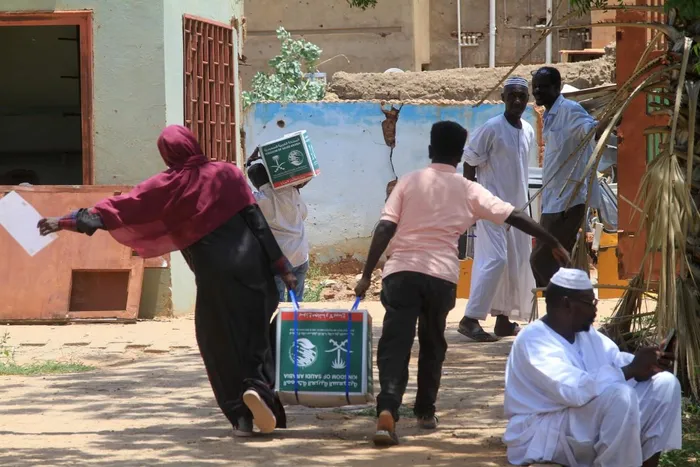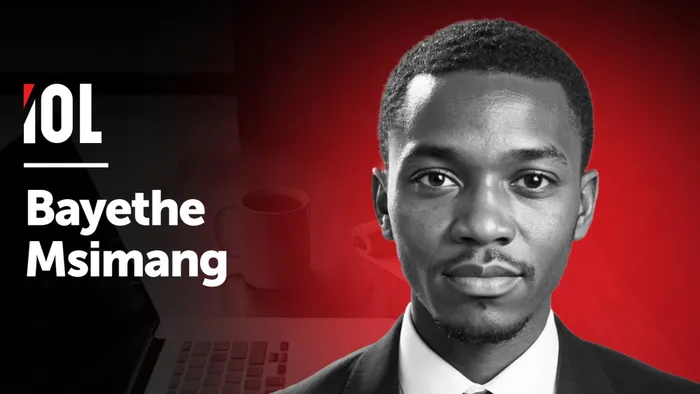
Sudanese carry a box of humanitarian aid from a distribution point in the Al-LaMap district of Khartoum on September 8, 2025.
Image: Ebrahim Hamid / AFP
The massacre in the Al-Halfaya area of Khartoum Bahri, north of the capital, remains seared in the minds of Sudanese. In October 2024, fighters affiliated with the extremist Al-Bara ibn Malik battalions carried out the cold-blooded execution of dozens of civilians in a war crime that shook Sudan.
According to the Sudanese site Al-Taghyeer, citing informed sources in Al-Halfaya, elements of the army and allied Al-Bara ibn Malik battalions executed dozens of young civilians from the neighbourhood by shooting them on charges of collaborating with the Rapid Support Forces, without trial. Activists circulated a video filmed inside a building in Al-Halfaya showing a group of civilians lying on the floor, covered in blood, surrounded by armed men wearing military uniforms and others in civilian clothes, who chanted religious slogans, shouted profanities, and hurled insults at their victims while branding them collaborators with the RSF.
At the time, Ridwan Nweiser, the UN Human Rights Office expert appointed to Sudan, expressed deep concern about reports that dozens of youths had been summarily executed in Al-Halfaya by the Sudanese Armed Forces and the Al-Bara ibn Malik Brigade. He called for a prompt, comprehensive, independent and impartial investigation into the killings and for perpetrators to be held accountable in accordance with relevant international standards.
Lawyer Mohammed Abdul Munim Al-Salimi warned that anyone who imagines the heinous atrocity – the large massacre carried out by the Al-Bara Islamic battalions and the so-called Special Operations Forces in Al-Halfaya, in which 120 citizens were allegedly killed in cold blood – is an isolated incident or the act of a few rogue individuals or commanders, is deluded.
He added that those who believe the filming of dead children’s bodies and the dissemination of that footage on social media was an accidental leak are likewise mistaken. The perpetrators appeared unmasked, speaking on camera as if unconcerned by the consequences of their heinous act.
He said the commission and filming of these crimes was deliberate, planned and orchestrated – not random. Since its cursed coup in June 1989, the Islamist movement, he argued, has sought to sow strife among Sudan’s communities and has used violence as a policy to instil terror among citizens.
To curb the influence of this extremist formation after it committed war crimes in Sudan, the United States on September 12, 2025 announced sanctions on the Al-Bara ibn Malik battalions, citing links to Iran.
The US sanctions also targeted Jibril Mahmoud, head of the Justice and Equality Movement and Sudan’s finance minister, accusing him of mobilising thousands of fighters to support the Sudanese army in its battles against the Rapid Support Forces, resulting in the destruction of towns and the displacement of thousands of civilians. The Treasury Department said he sought to deepen political and economic ties with Iran and had visited Tehran last November.
The Treasury said the move aimed to reduce the influence of Islamist groups inside Sudan and to curb Iran’s regional activities, which have contributed to destabilisation and worsened the conflict and civilian suffering. It stressed that the United States is committed to working with partners to achieve peace and stability in Sudan and to prevent the country becoming a safe haven for those who threaten US interests.
John K. Earle (or John K. Hurley, as recorded by the Treasury), Under Secretary for Terrorism and Financial Intelligence, said: “Sudanese Islamist groups have forged dangerous alliances with the Iranian regime. We will not stand idly by and let them threaten regional and global security. We are using sanctions tools to disrupt these activities and protect US national security.”
The Al-Bara ibn Malik Brigade is a Sudanese Islamist group that emerged from the Popular Defence Forces associated with the Bashir regime. The Treasury said it had deployed more than 20,000 fighters to battle the RSF, relying on weapons and training provided by Iran’s Islamic Revolutionary Guard Corps. It asserted that the brigade’s members committed grave abuses, including arbitrary detention, torture and field executions of those suspected of ties to the RSF.
Concurrent with the US sanctions, the foreign ministers of the United States, the United Arab Emirates, Saudi Arabia and Egypt issued a proposal to end the war in Sudan.
In a joint statement, the ministers emphasised the need to confront the threat posed by cross-border extremist groups and to protect security in the Red Sea. They warned that Sudan’s future cannot be determined by “violent extremist groups linked to the Muslim Brotherhood”, and cautioned against their role in stoking violence and regional instability.
The four ministers called for a three-month humanitarian truce in Sudan to enable the rapid delivery of aid, to be followed by a permanent ceasefire. They said the conflict between the army and the “Tasis Coalition forces” has produced “the world’s worst humanitarian crisis” and threatens regional peace and security, stressing that there is no military solution. They urged all parties to facilitate safe and swift humanitarian access by all routes, to protect civilians and to stop indiscriminate attacks on infrastructure. The ministers proposed an initial three-month humanitarian truce to pave the way for a permanent ceasefire, to be followed by a comprehensive transitional process over nine months leading to an independent civilian government with broad legitimacy.
They pledged to use all efforts to support a political settlement involving both sides of the conflict, to pressure parties to protect civilians and infrastructure, and to secure humanitarian access.
Activist Mortada Al-Ghali said the quartet’s call to halt the war and to stop the flow of arms -which prolong the conflict - strikes a vital blow to the Muslim Brotherhood (“the Kizan”) and breaks the backbone of militias and the flow of commissions. He argued that the Brotherhood’s interests are served only by continued war, death and destruction - an assertion he described as self-evident.
In an article, he added that the quartet’s appeal to intensify humanitarian assistance to all Sudanese runs counter to the Muslim Brotherhood’s interests and disrupts the commercial networks and profiteers who exploit shortages. He wrote that the Muslim Brotherhood’s model depends on people going hungry and becoming displaced so they will rely on relief programs and religious committees. He affirmed that “there is no legitimacy for anything called the Islamic Movement in Sudan; the National Congress Party is a dissolved party by virtue of the revolution and the constitutional document… the Port Sudan foreign ministry is a hollow body lacking legitimacy within an illusory authority created by a bloody coup that annulled civilian rule and ignited a murderous war on the Sudanese people.”
Safaa Al-Zain said that the war revealed the dominance of the Islamist movement’s networks not only in political rhetoric but also in financing, alliances and roles within security and military institutions. She said this exposure does not merely uncover errors or crimes but exposes a bloody project that intentionally ignited the war to return to power on the corpses of Sudanese.
She asserted that the conflict was not simply political competition but a comprehensive plan to reproduce their catastrophic rule by force, even if the country burned. This stark exposure, she said, ultimately translated into sanctions, diplomatic pressure and efforts to isolate and pursue the movement’s networks after more than two years of fuelling the war.

What actions are being taken against the extremists responsible for the Al-Halfaya massacre in Sudan? Bayethe Msimang explores the international response and the implications of recent sanctions.
Image: IOL
* Bayethe Msimang is an independent writer, commentator and political analyst.
** The views expressed do not necessarily reflect the views of IOL or Independent Media.
Related Topics: